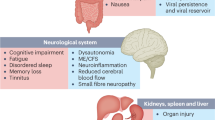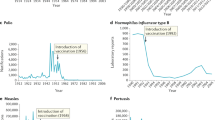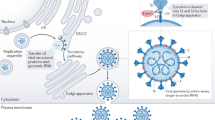Abstract
As chloromycetin has shown promising results in various virus infections in man, it was decided to investigate its activity against experimentally induced rabies. Two rabbits were inoculated intracerebrally with the strain of fixed virus previously described by Kirk inNature1. The rabbits received respectively 100 and 200 mgm. of chloromycetin per kilo daily, given in three equally divided doses by mouth. As controls three rabbits were used; two received 20,000 units penicillin in procaine oil per kilo daily, and the third 40 mgm. of streptomycin per kilo daily in two equally divided doses by intra-muscular injection. Therapy was started in all cases twenty-four hours before inoculation. All five rabbits died on the fifth day and no change in the incubation period or manner of death could be detected.
This is a preview of subscription content, access via your institution
Access options
Subscribe to this journal
Receive 51 print issues and online access
$199.00 per year
only $3.90 per issue
Buy this article
- Purchase on Springer Link
- Instant access to full article PDF
Prices may be subject to local taxes which are calculated during checkout
Similar content being viewed by others
References
Nature, 143, 77 (1939).
Author information
Authors and Affiliations
Rights and permissions
About this article
Cite this article
BATES, J. Failure of Antibiotics in Experimental Rabies. Nature 166, 155–156 (1950). https://doi.org/10.1038/166155c0
Issue Date:
DOI: https://doi.org/10.1038/166155c0
Comments
By submitting a comment you agree to abide by our Terms and Community Guidelines. If you find something abusive or that does not comply with our terms or guidelines please flag it as inappropriate.



